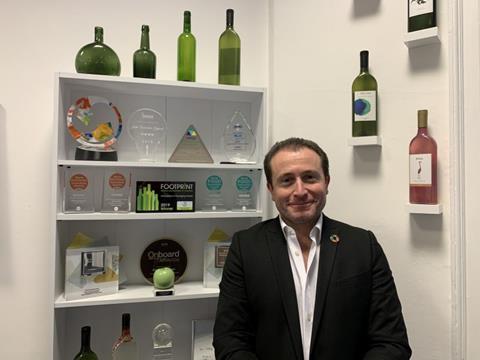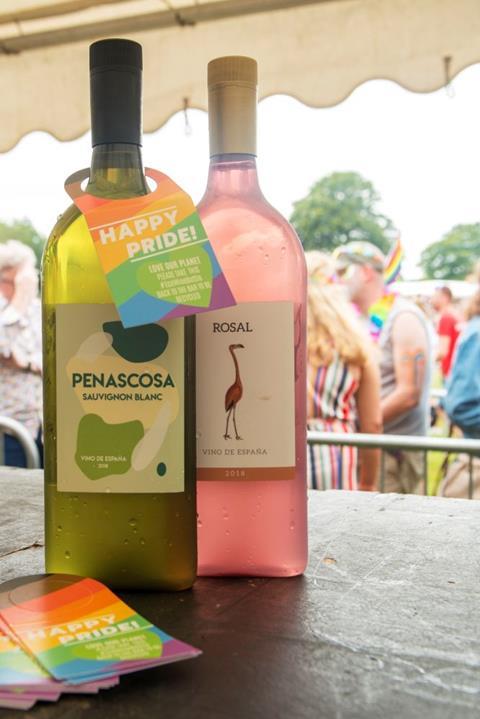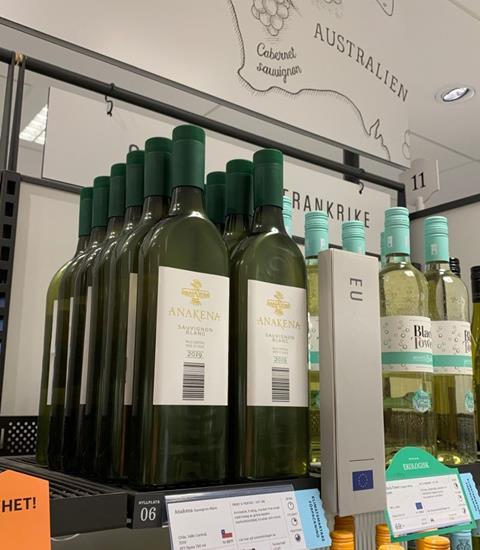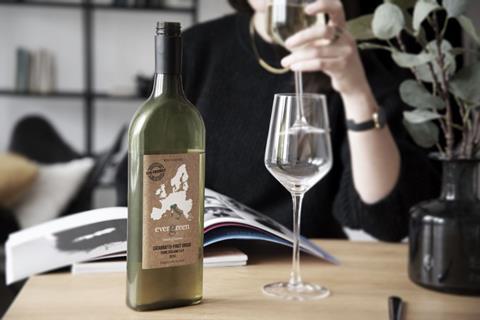
Garçon Wines has made waves in the industry with its reimagination of the traditional glass wine bottle – a flat bottle that fits through a standard letterbox and that is made from 100% recycled PET. Elisabeth Skoda catches up with the company’s CEO, Santiago Navarro, discussing innovation and sustainability as well as challenges and solutions for an omnichannel retail space.
Looking back at the early days of Garçon Wines, what obstacles did you have to overcome when developing the flat wine bottle, from a material and sustainability point of view?
There were several challenges. Producing the lateral stretch and corners required for the bottle successfully from virgin PET is already a challenge, and achieving the same with recycled PET is even harder.
When we first introduced the concept in early 2017, we only had a handful of prototype bottles, and at that time, recycled PET and the circular economy wasn’t talked about as much. But for me, as an entrepreneur, knowing the likely benefit, it was the right thing to do, and the risk has paid off. The interest it generated made us realise we had the opportunity to create a scalable packaging solution for the wine industry.
When it comes to sustainability, it is important to distinguish between scalable sustainability and niche or conceptual sustainability. A lot of sustainable products are likely to be niche and conceptual. The problem is that it distracts from reality, a bit like the concept car at a motor show, which gets a lot of focus, because it looks like batman's car, for example, but it's never going to ship. What's going to ship is the larger scale, more functional product. For me, PET is a wonder material and best in class, and for us, really the only option for scalable sustainability. Traditional wine bottles come from an era when products were moved by horses. We need packaging for an era that uses electric vehicles, and recycled PET fit the bill.
You’ve been working with major packaging companies such as Berry M&H, DS Smith, and Amcor. How important are collaborations for success?
Collaborations are essential. We collaborate with giants because it helps us to execute that scalable sustainability plan. If we tried to do it alone, we'd probably find ourselves in the area of niche sustainability.
The climate crisis is the largest challenge humans will face in thousands of years - it's an existential threat. Collaboration is fundamentally important for the circular economy and for helping to address the climate crisis. For example, the Ellen Macarthur Foundation is based on collaboration between organisations, some of which may even be direct competitors. No company, whether it's a giant or a start-up, will achieve alone what we need to achieve by 2030 if we want to make sure our planet remains habitable.
But the commercial market won't manage on its own. Through collaboration between policy makers and business leaders, we will create legislation that works.
Keeping an eye on the triple bottom line is important. First and foremost comes the planet, as it is in a bad shape. But it’s also vital to not lose sight of people and profit. If we reverse the damage to our planet but have economies and supply chains that are not functioning, we're going to create a different set of problems.
Garçon Wines bottles are made from 100% recycled PET. As the company grows, do you foresee any challenges with sourcing enough recyclate?
Having too much carbon in our atmosphere is not a good problem to have. If we get to the point where recycled PET demand outstrips supply, then we have a good problem, as it means we're using enough recycled PET. I hope that we and everybody else will have supply issues, as it means that we are doing the right thing. The increase in demand in recycled PET has also meant increased investment. I'm confident that people, entrepreneurs and governments will put in place the resources required to ensure there is enough supply, and we as a company will try to be even more circular and make the best use of the material.

Recycled PET is best in class at the moment, although we have been looking at alternatives such as PEF for wine bottles specifically. Innovation, best in class material and recyclability by design are the three pillars create the foundation of our cleantech packaging solution. This also provides a butterfly effect across the supply chain. If you design packaging from a primary packaging perspective, you unlock a whole range of positive effects further across the supply chain. For example, with our bottle, you can send more product on a pallet and you can fit more bottles on the supermarket shelf.
How do you ensure the bottles don’t end up as litter?
Of course, we don't want our bottles to end up as litter, no packaging company does. However, companies should be wary of being overcautious in their approach. There is no utopia, but improvement is possible. We have to strive for perfection, but we won't get there.
For us, the primary way we help mitigate against our bottles ending up as waste is to make a product that has strong messaging to recycle, so that consumers know what the right thing to do is. But we are challenged by an abundance of human beings who are uncaring for the planet. Having said that, it’s important to make life easier for consumers. Packs that need deconstructing and taking apart prior to recycling can be problematic. We need to account for people who are just busy getting through life, and we should make it easy for them to do the right thing.
E-commerce has enjoyed huge growth, which has been accelerated further due to the COVID-19 pandemic. What would you describe as the key challenges when it comes to shipping beverages, and wine in particular, and how does Garçon Wines help to address these?
The global pandemic has been a once in a century scenario. Whilst e-commerce was growing massively even prior to COVID-19, the pandemic suddenly brought a situation where people had to use e-commerce to keep their fridges full.
Due to the big choice in the wine market, it naturally is a product that can work well in an e-commerce setting. Importantly, wine is a truly global product that comes with an extremely complex supply chain with many steps between the winery and the dining table..
E-commerce is a difficult 21st century commercial model. At Garçon Wines, we are convinced that wine needs 21st century cleantech packaging that makes it economical for e-commerce. Our bottle is lightweight, spacially efficient due to its design, and shatter proof. Importantly, it's a product that respects the heritage and tradition of wine, it looks like a wine bottle, it's designed for wine. Very little packaging is needed to get the wine to its destination safely, it is low on energy and recyclable.
The borders between brick and mortar retail and e-commerce are becoming more blurred. How can packaging help to navigate this new landscape?

The borders have been blurred from a consumer perspective, but also from a business perspective, with the rise of services such as click and collect. Companies have to ask themselves what packaging is fit for purpose in the 21st century. Does a pack work as well in store as it would through the complex logistics supply chain of last mile delivery, for example? That’s why it is important for a bottle to look good and stand out on the shelf as well as being easy to ship.
Research indicates that a product that is wider and taller than an alternative will attract attention, and may command a premium price. A packaging expert looking at our bottle might immediately see its benefits, such as being able to fit more product in the space provided, and more product on the pallet, and more pallets in the container. But when it comes to consumers shopping in bricks and mortar stores that are faced with the daunting “wall of wine”, it's important to first and foremost important to be eye catching.

Another point: we still restock shelves by hand in 2021. Being able to fit nearly twice the product on the supermarket shelf reduces restocking cost. In the 21st century world, where we have that blurring of bricks and mortar and e-commerce it is important to see whether the packaging works well both in a competitive retail space, and in a supply chain where consumers increasingly expect immediate deliveries of products, and warehouses are becoming more local.
What does the future hold for Garçon Wines?
Our future will be exciting - multi-company, multi-channel and multi-country.
Garçon Wines, has recently secured £670,000 of investment our in parent company Delivering Happiness Limited, which will be deployed to expedite start-up’s growth. This will include the launch of a dedicated, multinational cleantech packaging business arm for wine and other drinks, which will operate alongside their sustainable wine wholesale business. It will also include production investments in Australia and the USA, with the launch of staffed offices in these markets.
We'll also continue to collaborate with other companies and brands and build on our successful collaborations. Despite the challenges of COVID-19, flat wine bottle volume grew by more than 20 times in 2020.We came out of the crisis well because we innovated, and will keep doing so.











![_DSC5322[13]](https://d2wrwj382xgrci.cloudfront.net/Pictures/100x67/4/4/7/9447__dsc532213_109933.jpg)

